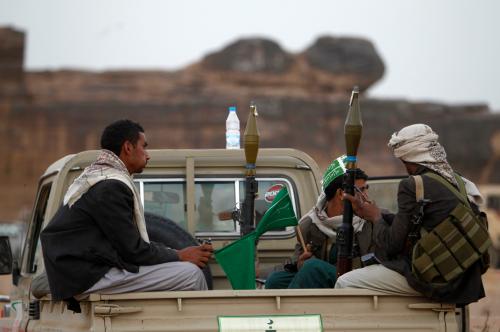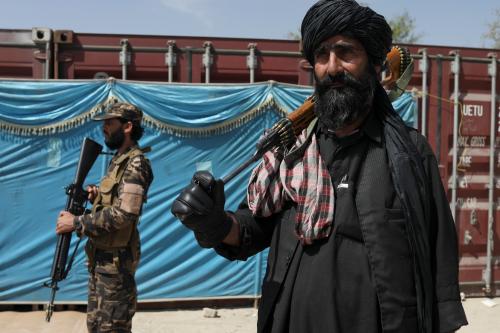Content from the Brookings Doha Center is now archived. In September 2021, after 14 years of impactful partnership, Brookings and the Brookings Doha Center announced that they were ending their affiliation. The Brookings Doha Center is now the Middle East Council on Global Affairs, a separate public policy institution based in Qatar.
The release of the Senate Intelligence Committee report on the Central Intelligence Agency’s use of torture has drawn fairly muted reactions across the Middle East, despite initial White House concerns that it might provoke unrest as well as possible retaliation against American interests and facilities in the region.
Secretary of State John Kerry sought to delay the report’s release on December 5 due to concerns over fall-out from the report’s revelations, while Representative Mike Rogers, chairman of the House Intelligence Committee, warned that “foreign leaders have approached the government and said, ‘You do this, this will cause violence and deaths’.” Security at U.S. military and diplomatic facilities was enhanced in the run-up to the report’s release. However, few governments in the region released official statements on the issue, with news coverage similarly sparse. There were no significant protests surrounding the report’s release.
Despite the relative dearth of official coverage, information on the report was widely circulated on Twitter under the hashtags #تقرير_التعذيب (#Torture_Report) or تقرير_الكونجرس# (#Congress_Report). Maps showing Arab countries’ participation in the program were shared via Twitter. Many Tweets criticized countries that participated in the program — the Open Society Foundations has cited 54 countries, including many in the region — or praised those that apparently did not, including Oman, Qatar, Tunisia and Sudan.
Iran and Afghanistan
Iranian officials were among the few in the MENA region to comment publicly on the CIA torture report. Foreign Ministry spokeswoman Marzieh Afkham condemned the program, saying the report documented “violence, extremism, and secrecy as institutionalized in the US security system.” Likewise, Iranian Parliamentarian Muhammad Saleh Jokar referred to the CIA report as “the final bullet in American human rights” in remarks to the hard-line official Tasnim News Agency.
A Twitter account linked to Supreme Leader Ayatollah Ali Khamenei also published several tweets criticizing the United States for hypocrisy with respect to human rights, in some cases linking the torture report to demonstrations against police brutality and racial injustice in Ferguson, Missouri: “They claim #humanrights &trample its basics in their prisons,in interactions w nations &even w their own ppl.#TortureReport #Ferguson”
In another official reaction, Afghan President Ashraf Ghani said the methods used against prisoners had “violated all accepted norms of human rights in the world.” In addition to condemning the ‘inhumane’ and ‘unjustifiable’ actions revealed in the report, Ghani demanded to know how many Afghan people were subjected to torture at black sites inside the nation.
Turkey
The report received wide-ranging coverage in Turkey, as noted by a report in al-Monitor. In comments echoed by foreign Minister Mevlut Cavusoglu, the Turkish Ministry of Foreign Affairs stated that “torture and other brutal, inhuman or degrading treatments or punishments are unacceptable under any circumstance.” However, the statement called the report a “positive step in terms of transparency.”
Pro-government and Islamist writers generally criticized U.S. actions as well. Prominent Islamist commentator Akef Emre, writing for Yeni Safak, criticized American actions, while Yeni Safak editor Ibrahim Karagul argued that the Senate report did not go far enough in exposing U.S. officials’ complicity. However, the Cumhuriyet daily, whose editorial line is broadly critical of the ruling Justice and Development Party, accused the government of failing to seriously address allegations that it helped transit detainees across Turkish territory from 2002 to 2006.
Egypt and North Africa
Across much of North Africa, the CIA report received little coverage beyond wire stories on the subject. In Algeria, for example, major dailies such as al-Shorouq carried successive stories from AFP on the release of the report, the response of the UN special rapporteur on human rights and counterterrorism, and former Vice President Dick Cheney’s criticisms of the report yet did not comment on the Algerian government’s reported participation in the program. Only the independent and often-critical paper al-Khabar carried a detailed examination of Algeria’s role, though it noted that Algeria was only a “transit point” for detainees.
The report drew more attention in Egyptian print and broadcast media. Cairo University Professor Mustafa Kamel al-Sayyid, speaking to OnTV’s Lillian Dawud for the program al-Sura al-Kamila, suggested that prior revelations had shaped regional reaction to the report. “There were cases of torture in Abu Ghraib prison [in 2003] that were photographed, so this is nothing new for the United States, U.S. forces, or American intelligence services.”
Other commentaries condemned the United States for what was described as a double standard on human rights abuses and criticized Egypt’s involvement in the torture program. Muhammad Salmawy, president of the Egyptian Writers’ Union, implicitly criticized the United States’ ability to denounce human rights abuses in Egypt and elsewhere in the independent daily al-Masry al-Yawm. Recounting documented abuses, he noted: “This is the state of human rights in the United States, according to the testimony of the U.S. Congress. Can America still play innocent and condemn others?”
One early report in Tahrir News examined Egypt’s role in receiving several dozen detainees — as well as subjecting them to methods of torture such as electrical shocks and mock burials — beginning as early as 1995. The report emphasized Hosni Mubarak’s “strong relationship with America at the time” as a key factor. Likewise, both Rotana Masriya’s Tamer Amin on Min al-Akher and al-Nahar’s Mahmoud Saad on Akher al-Nahar criticized the role of “Mubarak’s Egypt” in receiving and torturing detainees “for the benefit of America.”
Al-Ahram columnist Muhammad Amin al-Masri wrote to counter this trend, noting that “The strangest thing is that some writers have taken advantage of this report to simply to address new accusations to the regime of President Hosni Mubarak as if he were the only devil ruling Egypt…If the American press described the report as a stain on the nation’s honor, then it is also a stain on the honor of every Egyptian official who participated in these crimes.”
Syria and Lebanon
In Syria, the Senate report made headlines at al-Ba’ath, the official newspaper for Syria’s ruling party, where Ma‘an Suleiman linked the CIA’s actions to America’s Syria policy, claiming that Washington “raises the banner of freedom and human rights as a pretext to interfere in Syria’s internal affairs.” The Syrian Arab National News Agency (SANA) highlighted CIA black site locations in Poland, Lithuania Thailand, and Afghanistan, but failed to comment on Syria’s role in cooperating with the U.S. rendition and interrogation program. There were no official statements from Syrian officials.
The torture report prompted little reaction from the Islamic State group, although a relatively small number of tweets from affiliated accounts drew coverage in Western media outlets. Aleppo-based journalist Edward Dark (pseudonym) noted that, at the very least, the report indicated that the United States was willing to admit a mistake.
Writing for Lebanon’s al-Safir daily, columnist Nur Abu Farraj noted simply that “nothing related to ‘the Central Intelligence Agency scandal’ is new.” There was no public comment from Hizballah in Lebanon.
Israel
The report garnered some coverage within Israel, with Yedioth Ahronoth’s Yitzakh Ben-Horin publishing an original article outlining the report’s findings, while Ma’ariv sufficed with AP wire reports.
The country’s English-language press featured more prominent discussion of the report, focusing primarily on the CIA’s citation of the ‘Israeli example’ — a reference to an Israeli Supreme Court ruling on torture and imminent threats to security — in constructing its legal case to justify the use of enhanced interrogation methods.
In English language edition of Haaretz, a left-liberal Israeli newspaper, Anshel Pfeffer outlined this aspect of the report while noting that the CIA’s enhanced interrogation of terrorist suspects often failed to produce valuable and accurate intelligence. An article in The Jerusalem Post, meanwhile, brought the CIA’s use of Israeli actions as legal precedent under further scrutiny. Yonah Bob Jeremy argued that the torture techniques used by the CIA went far beyond the standard permitted by Israeli courts, and were used even in cases where there were no imminent threats to security.
The Gulf States
Among the Arab Gulf states, the limited media coverage of the report did not address references to Saudi and Emirati participation in the CIA’s activities. Saudi academic and former minister Ali bin Talal al-Juhani, writing in pan-Arab daily al-Hayat, wrote that the report only confirmed “the fact known to security agencies in Saudi Arabia more than others, which is that torture hurts more than it harms.” In doing so, he claimed that Interior Minister Muhammad bin Nayef’s had rejected the use of torture in the Ministry’s campaign against extremism within the Kingdom, despite reports to the contrary.
Qatari legal scholar Abdel Hamid al-Ansari, writing for the Emirati daily al-Ittihad, deplored the damage that the torture program had dealt to America’s reputation while taking time to praise “that unique model in the Arab region and the world for protecting and upholding the rights and dignity of the imprisoned — the model of the United Arab Emirates.”
Elsewhere, Kuwait University Professor Ghanem al-Najjar reminded readers of the Kuwaiti daily al-Jarida that the country’s 1962 constitution bans torture. In the Bahraini Arab nationalist daily Akhbar al-Khaleej, assistant editor al-Sayyid Zahra charged that the United States has lost all credibility as a “defender of democracy and human rights,” adding “whether for Bahrain, Egypt, or any Arab nation, our countries should pay little attention to those others with their racist, colonialist stances towards us.” Omani media generally noted that, according to the report, the Sultanate played no role in the program.
Columnist Reem al-Harby was one of the few regional commentators to highlight the use of torture by Arab governments against their own citizens. She slammed Arab countries’ use of torture — both in cooperation with the CIA and independently — in the Qatari daily al-Raya. “Who will hold these Arab nations accountable for taking up with the American torture program?”
Lina Raslan contributed to this report.
The Brookings Institution is committed to quality, independence, and impact.
We are supported by a diverse array of funders. In line with our values and policies, each Brookings publication represents the sole views of its author(s).



Commentary
A Resounding Silence: Regional Reactions to the Senate’s Report on U.S. Use of Torture
December 29, 2014